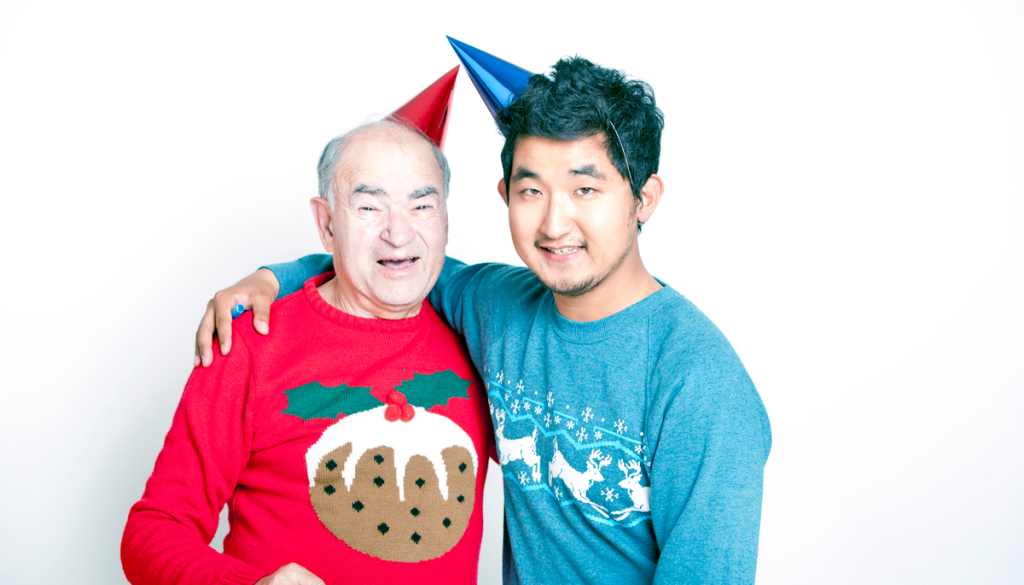For most of us, red and green decorations are joyous signs that the holidays are near, but for some elderly, they bring on the "holiday blues." Depression during the holidays is not limited to senior citizens, but memories of happier and healthier days gone by intensify the situation for the aged.
Signs that someone is experiencing seasonal depression, clinically known as Seasonal Affective Disorder (SAD)![]() , include excessive fatigue, unusual sadness, loss of appetite (or overeating), and disinterest in the holiday season.
, include excessive fatigue, unusual sadness, loss of appetite (or overeating), and disinterest in the holiday season.
If you are a caregiver to an older family member, here are some ways to help your loved ones cope with holiday season depression:
- Keep them busy: Schedule activities such as volunteering at local organizations, church events, holiday shopping and parties, decorating the house and tree, gift wrapping, baking holiday cookies or fruitcakes, and holiday arts & crafts projects. Activities that keep traditions alive, such as preparing a small batch of eggnog using a recipe handed down through generations, will help connect the present to previous happy holidays.
- Visits of their loved ones: Coordinate trips to help senior citizens see friends and family or to have them stop by for a visit. If in-person visits are not possible, be sure loved ones frequently stay in touch by phone. No one enjoys feeling forgotten or abandoned, so frequent visits and conversations are essential to helping avoid or deal with seasonal depression.
- Stimulating conversation: Talk with your elderly loved ones about subjects that really matter to them—even if the conversation is about why they’re feeling sad. Reminiscing about past holiday celebrations can help bring back the joy of the season. Intently listening and responding to their thoughts and feelings will help convey a sense that their memories are significant.
- Fresh air and sunshine: Bundle up and step outside to soak up the sun (a good source of vitamin D) during the day or to view a local holiday lights display at night—just be sure it’s not too cold or slippery (in the North) or too hot (in the South).
- Good food and good exercise: Whether or not your elderly loved ones are depressed, good eating and exercise habits are always recommended. During a case of the holiday blues, they are especially important and helpful. Be sure to not binge on food and alcohol during holiday celebrations. Also make sure to prioritize regularly scheduled physical activity—even if it’s just walking in the hallways of an assisted-living facility.
- Set future plans for events to look forward to: If the holiday season does not bring joy for whatever reason, focusing on plans for the spring and summer can help shift an elderly person’s focus to more-enjoyable activities that will be available at the end of winter. Thinking about a future trip to the beach during a summer vacation can help make a cold winter more tolerable.
- Get help: Seasonal depression is not just a passing phase—it is an actual health condition that can have dire consequences if not addressed effectively. If the condition is severe or long-lasting (more than two weeks), seek help from a doctor or other healthcare professional sooner rather than later.
Additional Information
-
Holiday Blues – Depression Among the Elderly
 (National Care Planning Council)
(National Care Planning Council)
-
Elderly Depression and the Holidays
 (Boomers-with-Elderly-Parents.com)
(Boomers-with-Elderly-Parents.com)
-
The Guide to Overcoming Holiday Depression for the Elderly and Their Caretakers
 (American Medical Resource Institute®)
(American Medical Resource Institute®)
-
Getting Help With the Holiday Blues
 (Care.com)
(Care.com)
-
Minimize the holiday blues for seniors suffering from depression
 (ExpertBeacon)
(ExpertBeacon)
-
Depression Pays Holiday Visit to Seniors: What a Family Caregiver Can Do
 (Senior Care Corner®)
(Senior Care Corner®)

